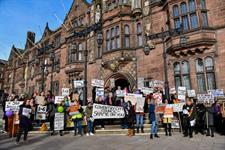A Coventry-based charity supporting victims of sexual violence has frozen its counselling waitlist due to a nearly £200,000 cut in local authority funding.
The Coventry Rape and Sexual Abuse Centre, which has been supporting victims of sexual violence and abuse for more than 40 years, will lose 15 per cent of its total annual income as a result of the cuts.
The charity received £195,000 a year from Coventry City Council as part of a five-year contract. The contract was due to come to a close at the end of June, with scope for a possible extension of two to four years.
But the council has decided not to renew the contract, resulting in the charity having to freeze its recruitment drive and close its waitlist for its over-13s counselling service.
The charity is continuing to operate a number of other services, including children’s counselling. It currently has just under 500 children and adults across all of its waitlists, with capacity to support about 130 people at any given time.
After the charity announced its waitlist closure, the council issued a public statement on its decision to end the funding, saying: “A key aim in 2019 was to reduce the length of time people were waiting for help – and rather than falling, those numbers have risen sharply.
“The current contract has not met key performance targets and adults can currently be waiting up to 18 months to access support.”
But a letter seen by Third Sector shows that the council informed Crasac that the decision was made “due to the unprecedented financial pressures that the local authority is facing”.
The letter said: “Budgets are currently under enormous pressure across all public services.
“The local authority has been systematically reviewing all all contracts and assessing their alignment with statutory duties and for the public health team, whether they form part of the core public health grant.
“Unfortunately, the current contractual arrangements with your service do not form part of what the Office for Health Improvement and Disparities consider to be ‘core’ public health work.”
Natalie Thompson, chief executive of Crasac, said: “I think we are just not being recognised as a professional specialism.”
She added that the council’s public statement, which was issued in response to the charity’s closure of its waiting list, refers to the charity’s waitlist as its only performance measure.
“But our performance has actually improved over the five years, We’re doing more now for the same amount of money.”
In a letter responding to the council’s decision, Thompson said: “You fail to acknowledge our other targets to support 200 individuals with 1-1 counselling, 100 individuals in the Independent Sexual Violence Advice service, plus a further 300 individuals from additional funding streams, an area we have significantly overachieved.
“The waiting list was never raised as a contractual concern, and we received no complaints about our service or any formal notice to improve.”
Thompson added that Crasac “never had” its two-year review of the contract, which was initially postponed due to the Covid-19 pandemic, saying this meant the charity was “denied the opportunity to review targets”.
While Thompson said that the funding cut had not put the charity at risk of closure, it would limit the support that it could provide to victims and survivors.
She added that access to specialist trauma-informed services for victims of sexual violence “cannot be found elsewhere” in the area, saying: “The local authority is under the illusion that the NHS can do it because they work with mental health, But they don’t offer sexual violence specialist trauma work.”
A petition urging the council to reconsider its decision has received more than 2,600 signatures and about 100 people attended a protest outside the council chambers yesterday, Thompson said.
A spokesperson for the council said: “Coventry City Council is absolutely committed to ensuring victims get the right support, and we have started a process working with the NHS and other providers to determine how a service can be appropriately commissioned to provide the right support in a timely manner.
“We want Crasac to engage in that process as we recognise the contribution they would make.”
